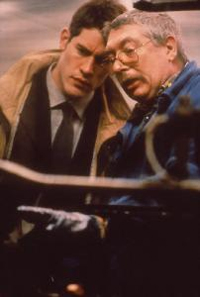All over the world, business leaders are trying to make their organizations more profitable and often this means ignoring the needs of workers. Human Resources is a riveting portrait of how hard it is to keep your soul alive in the workplace. Frank, a business school student, returns home for the summer to work as a trainee in a local sheet metal factory of a large conglomerate. His father has worked there for 30 years, and his sister has joined him. Now, to his family's delight, it looks like Frank will be able to transcend his working-class background and be successful in management. But there is a sharp generational gap between the way Frank and his father look at work.
The drama, written and directed by Laurent Cantet, uses the changeover into a 35-hour work week as a catalyst to set the members of the trade union against management. Frank suddenly finds himself caught up in a battle of wills, and when he finds out some critical information, he must decide where and with whom he will stand. Human Resources opens up many complex and ethically provocative issues related to today's job market as well as personal questions related to family and the workplace. In a time when Western countries are losing factory jobs, the concerns raised by this film are very timely. It puts human faces on political rhetoric about this important segment of the global economy.
This French film won over 17 International Awards including the Jury Prize at the Seattle International Film Festival. The film, which is subtitled, runs 103 minutes and has not been rated. For a detailed review and plot synopsis, click here.

1. Contentment at Work
"Contentment is work so engrossing that you do not know that you are working — contentment was absorbedness," Donald Hall writes in Life Work.
- Describe the different understandings of work expressed by Frank, his father, Alain, and Mrs. Arnoux, the union organizer. Which one comes closest to your idea of work?
- Have you ever experienced what Donald Hall describes as the contentment that comes from being fully absorbed in what you do? When was the last time you felt this? What attitudinal shifts can you make in your daily labors to achieve this absorbedness more often? What spiritual practices can help in this process?
2. Good Work Expresses Our Souls
"When freedom and craft have been squeezed out of work it becomes toil, without mystery or meaning, and that is why many people hate their jobs. You can measure the drudgery of a job by the number of layers of supervision required to keep the wheels spinning or the cash registers ringing. Toil drains us; but good work may renew us by giving expression to our powers," Scott Russell Sanders notes in Writing from the Center.
- What is your response to the supervisor who pressures Frank's father to increase his output on his machine? Respond to the argument that it is impossible to have freedom and craft in factory settings because of the emphasis on labor-saving machines and technology.
- How many layers of supervision do you have at your job? What impact does this have on your feelings of worth and accomplishment? Do you see most of your labor as "toil" or as "good work"? Among your friends and family, how many ever talk about giving expression to their essential being through work?
3. The Source of Boredom
Rabbi Terry Bookman in The Busy Soul says: "The source of our boredom is ourselves, combined with the expectation that the world and others must keep us entertained. The world is not a boring place. Our minds and imaginations are rich enough resources to keep us interested and interesting. It is we who fail to tap that resource from time to time. If you are feeling bored, or that life is monotonous, ask yourself, 'What is it that I am doing (or not doing) internally to create that feeling?' As an antidote, think of all the miracles that are a daily part of our lives."
- One thing that really peeves Frank is that his father is not bored with his job. In fact, the old man takes great pride in telling him that he has successfully punched 700 parts per hour on his machine for many years. In what ways do you identify with Frank's father and his attitudes toward work? What is your reaction to Frank's restlessness with what he considers to be boring work?
- Many people when asked to list their complaints about work note that it is incredibly boring. Respond to Rabbi Bookman's criticism of those who think that the world and others must keep us entertained. Do you expect your employer to make sure your work is not boring? Try the exercise suggested by Bookman as an antidote to boredom.

4. Eroding Job Security
In The Future of Success, Robert B. Reich writes: "Nothing focuses the mind of a chief executive, or of anyone else for that matter, like the prospect of vast wealth and the possibility of being sacked. The increasing single-mindedness of top executives on increasing their share prices by cutting costs and improving their products is reverberating through the economy. The good news: American corporations have become more productive and their goods and services dramatically better. The not-so-good news: all jobs and earnings have become less secure, and wages and benefits of routine production workers have eroded."
- What are your initial responses to the Chief Executive and the Head of Human Resources at this factory? Give some examples of their patronizing view of the workers. What do you think Frank hopes to achieve as a trainee at the factory? What does he learn about his boss and the Chief Executive that angers him?
- The gap between the very rich and the rest of us is widening every year. What does this film say about the gulf between management and workers?
5. You and Your Adversaries
"In the days of duels with pistols, the antagonists stood sideways as they raised and aimed their pistols to present as little a target as possible. When you contribute to your adversary's ability to hurt you by acting in ways that present a broad target, you are not only hurting yourself but also allowing your adversary to bring out the worst in herself. No adversary is wholly bad. There are redeeming qualities in everyone. One way to bring them out is to model them for your adversary. Act your best, and your adversaries will have a harder time acting their worst," Lewis Richmond writes in Work as a Spiritual Practice.
- Neither management nor the union representatives make any effort to stand sideways in their meetings with each other. What is your response to Mrs. Arnoux's moral stands? What are the redeeming qualities in her and some of the other characters in the drama? What qualities make her and the others difficult to work with?
- Take some adversary you have at work. Have you ever tried standing sideways with that person? The next time you have some conflict, try Lewis Richmond's advice and see what happens.
6. Remaining Vividly Alive Inside
In Work as a Spiritual Practice, Lewis Richmond writes: "No matter what frustration and indignities erode our sense of dignity on the job, inside we remain vividly alive. No matter how insecure our tenure at work, no one can hand a pink slip to our soul. No one can say to our inner life, 'You're fired!'."
- Share your own scenario on what will happen to the workers and management at this factory in the long run. What does the filmmaker seem to be saying about the reality of a humane capitalism?
- Do you identify with the philosophy that no one can hand a pink slip to our souls? Why or why not?

7. Shame Is Heavy, Grace Is Light
"Shame is heavy; grace is light. Shame and grace are the two counterforces in the human spirit: shame depresses; grace lifts. Shame is like gravity, a psychic force that pulls down. Grace is like levitation, a spiritual force that defies gravity. If our spiritual experience does not lighten our life, we are not experiencing grace," Lewis B. Smedes said in in Shame and Grace
- Frank's outburst against his father on the factory floor is difficult to watch. What lies behind this vehement expression of shame? What do you feel for Frank's father during this scene? What is there in Frank that stops him from reconciling with his father?
- Talk about the closing scene where Frank is sitting outside the circle of union members and the striking workers. Where is his place? Where is your place in the workplace? What new insights has this French film given you into work?
A Prayer to Accompany the Closing of the Film
God, help us not to despise and oppose what we do not understand.
— William Penn
This guide is one in a series of more than 200 Values & Visions Guides written by Frederic and Mary Ann Brussat. Text copyright 2004 by Frederic and Mary Ann Brussat. This guide is posted as a service to visitors to www.SpiritualityandPractice.com. It may not be photocopied, reprinted, or distributed electronically without permission from Frederic and Mary Ann Brussat. For this permission and for a list of other guides in the Values & Visions series and ordering information, email your name and mailing address to: brussat@spiritualrx.com.
